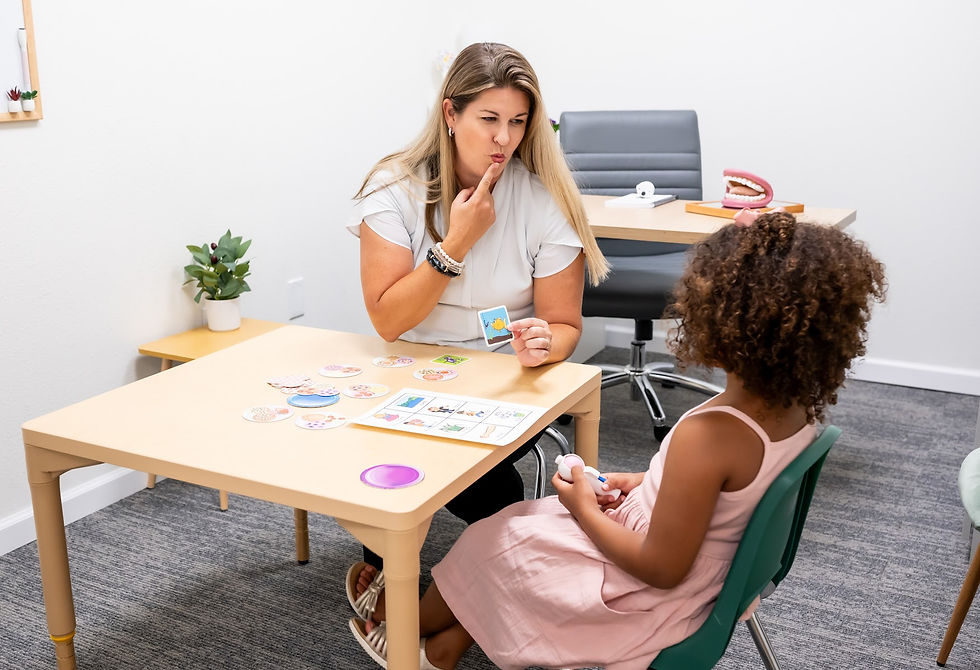When Should I Be Concerned About My Child's Speech Sound Errors?
- Cara Bridge

- Jul 28
- 3 min read
Understanding Articulation Disorders and When to Seek Help for Your Child's Speech Sound Development

As a parent, it’s a joy to hear your child’s first words - a milestone that marks the beginning of their communication journey. But what happens when your child’s speech doesn’t sound quite right for their age? Have you ever wondered whether your child’s mispronunciations are part of normal development or signs of something more? In this post, we’ll break down what articulation is, how it relates to your child’s speech sound development, and when it’s time to seek help from a speech-language pathologist.
What is Articulation?
Articulation is the movement of your tongue, lips, teeth, and jaw to produce speech sounds. It's a key part of how children learn to speak clearly and be understood. As children begin to talk, articulation errors are a normal part of speech development. It is typical for children to have difficulty pronouncing different sounds and words.
What Does Typical Speech Sound Development Look Like?
It is important to remember that every child is different, but 90% of children have developed sounds by these ages. Crow & McLeod (2020)
AGE | SOUNDS |
2 Years | H, P, N , D, M, B, W |
3 Years | T, F, Y, K, G, NG |
4 Years | L, V, S, SH, Z, J, CH |
5 Years | Voiced TH, R |
6 Years | Voiceless TH |
Types of Speech Sound Errors
Articulation errors: difficulty producing specific sounds like /r/ or /s/
Phonological errors: patterns of sound errors
Substitutions - i.e. substituting front sounds for back sounds (tookie for cookie)
Syllable Structure - i.e. leaving off final consonants (boo for book)
Impacts of Speech Sound Disorders
Impact on Literacy Development: Speech sound disorders can directly interfere with a child’s ability to develop strong reading and writing skills.
Phonological awareness difficulties: Children with speech sound difficulties often struggle to recognize and manipulate sounds in spoken words (like rhyming, segmenting, and blending sounds), a key skill for early reading development.
Spelling difficulties: Misarticulating sounds can lead to confusion when mapping sounds to letters, resulting in poor spelling.
Reading Decoding Problems: If a child has trouble accurately producing or perceiving speech sounds, it becomes harder to "sound out" unfamiliar words when reading.
Social-Emotional Impact: Speech sound disorders can have negative effects on a child's confidence and self-esteem. When a child is difficult to understand, they may be teased or asked to repeat themselves over and over. This can lead a child to withdraw or avoid social situations. It could also lead to children avoiding answering questions in class, asking teachers questions, or speaking up when something is wrong.
When to Seek Help From a Speech Language Pathologist
Early intervention can make a big difference - the earlier the support, the better the outcomes for communication skills, self-esteem, and learning.
Consider consulting an SLP if:
Your child's speech is difficult to understand after age 3-4
Your child is omitting sounds consistently after age 3-4
Your child is having difficulty with sounds after the ages listed above
Your child shows frustration or withdraw from speaking due to difficulty being understood
Teachers or caregivers express concerns about their ability to understand your child
How Can a Speech Language Pathologist Help?
An SLP will evaluate your child’s speech through standardized testing, informal observation, medical history, and conversation. They’ll determine if the errors are developmental or indicative of an articulation/phonological disorder. If therapy is recommended, sessions will typically focus on teaching your child how to correctly produce the target sounds or sound patterns. SLPs do this through modeling, oral motor exercises, repetitive practice, play-based learning, and home programs and strategies for parents. Speech therapy is fun!

If you have concerns about your child's speech sound development and are located in the Tampa Bay area, please contact Bridge Speech Therapy to speak with a Speech Language Pathologist.





Comments